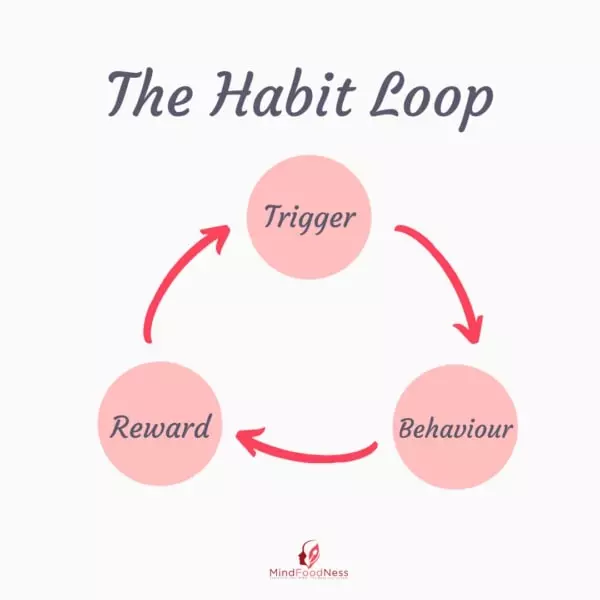
BREAK HABITS
How can we break habits that no longer serve us? Habits are regular practices that are seemingly difficult to give up. We all have them. They can permeate all aspects of our lives and can be both subtle and forthright. Some habits can be positive, and others detrimental to our goals. But why are habits so difficult to change and shift from our lives? Let’s have a look into specifics about how to break habits that no longer serve you.
BREAK HABITS: UNDERSTANDING THE PROCESS
Ultimately, the process to stop unfavourable habits in their tracks is simple (I promise). It is all about understanding the inner-workings of how habits form and interrupting this pattern. We all have great intentions around eating healthy and preparing nutritious food (or whatever habits you would like to focus on). So what happens? How come autopilot kicks in so suddenly and easily? Before we know it, we are nearly finished the bag of chips we never even planned on eating! Then we find ourselves mindlessly eating again…. what?!

HABITS MEET A NEED
First, we need to understand that all habits meet a particular need. They give us a particular reward. Otherwise, we would not do it! Let’s look at a common issue people experience with night eating or NES. You are not hungry and you know this, but you are bored watching TV and go to the kitchen to eat. Then you go back to watch TV. Then boredom kicks in again, and you go back to the kitchen for a snack. This repeats over and over until you go to sleep. Obviously, the reward is that the food is making you feel good and it gives you something to do = you feel less bored. After all the back and forth in the kitchen, you eventually feel guilty and bad. Luckily we can interrupt this process to change paths.

UNDERSTANDING THE HABIT PROCESS: TRIGGER – BEHAVIOUR – REWARD
Apart from being rewarded, what else underlies a habit? It is important to understand that a habit becomes automatic once we create a connection between the habit and the trigger. A trigger is an event that will initiate the automatic compulsion to do a habit. The aim is to take the habit off autopilot by either eliminating the trigger or changing the behaviour.
Night Eating
So for this example of night eating, the trigger is watching TV that causes the boredom. There is a sensation of boredom in the body and mind that provokes you to eat (which is the behaviour). Through eating, you will feel entertained for a short-period and experience temporary satisfaction. Then, your brain will remember this feeling (reward) and you will therefore do it again (again and again). This then becomes the habitual and autopilot behaviour that we can not seem to shake.

HOW TO BREAK THE HABIT
1. Change the trigger or behaviour
We break the habit by identifying and deconstructing the trigger, behaviour and reward. Many options are available here. First, you can change the trigger (watching TV). Instead of watching TV you might decide to connect and talk to your partner. Other possibilities could include playing games with your family, reading a book or going to the gym. What else can you do that won’t give you the feeling of boredom? This changes the trigger, and the need to eat lessens. Plus you have fulfilled the reward via a different behaviour.

2. Observe the Feeling
Secondly, another option is to observe the sensation of boredom in your body without the need to change it. For many, the reason why we eat is to fulfil emotional voids, because we want to change how we feel. Ask yourself, ‘What are you truly seeking’? So, what if you simply observe the sensation of boredom in your body. Where is it showing up? How does it feel? What form does it take? Lean into it, and do not be afraid of it. You might notice other emotions arise also. Watch these feelings and sensations pass.
You also become rewarded for this because you did not overeat and went to bed feeling good. You will sleep better and in the morning wake up fresh because you did not overeat in the night time. Further, you will create a healthy cycle and eating pattern without skipping meals causing night eating the following evening.

BREAK HABITS BY IDENTIFYING THE TRIGGER, BEHAVIOUR AND REWARD
In a nutshell, to break a habit we identify the trigger, behaviour and reward. Then, we decide how we will change it – via the trigger or behaviour. It is as simple as that. You will consciously break the chain reaction and pattern. If you have trouble identifying any of these, I can help! Reach out and send me a message or email. I am happy to help.
FREE GIFT FOR YOU
I have created a free Habit Planner and Habit Tracker. This is one of the most comprehensive workbooks I have made, and it is completely free. You can focus on priority goals in any part of your life, such as finances, relationships, fitness or health and easily track your progress. It will help you to easily identify and track habits whilst staying motivated. Super easy to follow. Fast track your goals and download below.

REACH YOUR GOALS WITH THIS FREE PRINTABLE
HABIT PLANNER + TRACKER
- Get closer to health, happiness, wealth, dream relationship or anything else you wish faster
- Identify your current habits that keep you stuck
- By focusing on only 3 habits at a time, you set yourself up for success to achieve any goals you have.



